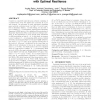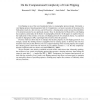310 search results - page 11 / 62 » An Efficient Protocol for Fair Secure Two-Party Computation |
PODC
2009
ACM
14 years 10 months ago
2009
ACM
Consider a completely asynchronous network consisting of n parties where every two parties are connected by a private channel. An adversary At with unbounded computing power activ...
CIS
2004
Springer
14 years 3 months ago
2004
Springer
Abstract. In the m-out-of-n oblivious transfer model, Alice has n messages, Bob has m choices. After the interaction between the two parties, Bob can get m but only m messages from...
FOCS
2010
IEEE
13 years 7 months ago
2010
IEEE
Coin flipping is one of the most fundamental tasks in cryptographic protocol design. Informally, a coin flipping protocol should guarantee both (1) Completeness: an honest executi...
CSIE
2009
IEEE
14 years 4 months ago
2009
IEEE
Customers are usually passive in an electronic commerce transaction. Based on a new two times concurrent signature, this article presents a fair electronic payment (E-payment) pro...
CRYPTO
2009
Springer
14 years 4 months ago
2009
Springer
The problem of carrying out cryptographic computations when the participating parties are rational in a game-theoretic sense has recently gained much attention. One problem that h...



